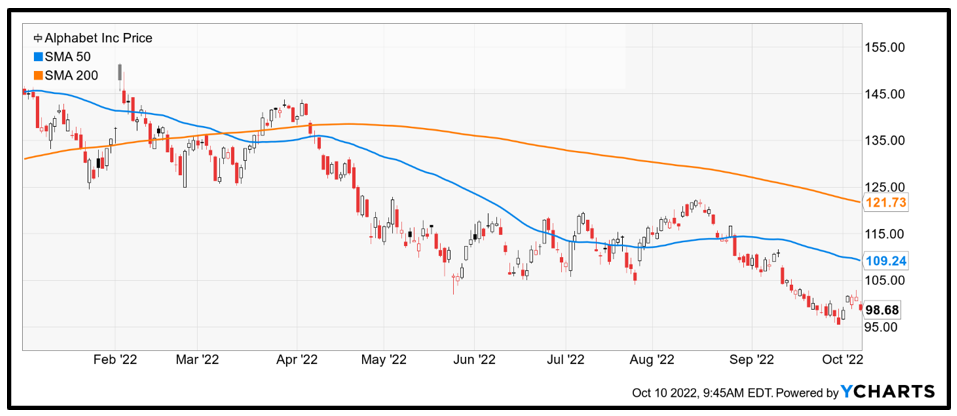Alphabet Will Benefit From Rise of Malevolent AI
Musicians often sell their song rights for use in advertising. Now, technology is good enough for actors to sell their voices and likenesses, and policy makers are worried.
Representatives for Bruce Willis denied last week that the actor sold his likeness to a deepfake company, the first deal of its kind in Hollywood. It’s the beginning of a new era for investors.
Investors should consider buying Alphabet (GOOGL). Let me explain.
Typically, deepfakes are typically manipulated videos in which the likeness of a famous person is digitally inserted to deceive the viewer.
Deepfakes are now almost indistinguishable from real videos due to the acceleration of generative adversarial networks, which use artificial intelligence to continually improve, and the results are shockingly effective.
A YouTube video posted in 2020 from Disney Research Studios showed photorealistic imagery being created on the fly for targeted actors.
Companies such as Deepcake are pushing GANs even further. Its digital twin technology is being pitched to A-list Hollywood actors as an opportunity to monetize their likeness without physically going to makeup, learning lines or being on set.
A publicist for Deepcake told The Hollywood Reporter that Bruce Willis worked with the firm in 2021 on a Russian commercial for a local wireless phone operator.
Willis has since retired from acting after being diagnosed with aphasia, a condition that prevents him from understanding or expressing speech.
Deepfake opponents worry about illusory speech.
Related Post: CarMax’s Breakdown Bad for Auto Industry
The persistent use of illusion blurs the line between what is real and what is not real. A so-called liar’s dividend occurs, where the public can be easily manipulated to distrust the truth.
This is especially worrisome with video. People tend to believe the images they see versus the words they read or hear.
What the world needs right now is …
Technology to Combat Nefarious Deepfakes
This software would be a trusted source to quickly flag what is fake. Unfortunately, investors worry that the lousy economy will make development impossible.
Necessity is the mother of invention.
Analysts at Morgan Stanley (MS) found worsening macroeconomics often accelerate tech breakthroughs. In “Moonshots,” a 91-page investment research report about disruptive technology, analysts revealed that companies are forced to be more disciplined during downturns. They solve for customer pinch points, both present and evolving.
American Airlines Group (AAL) and United Airlines Holdings (UAL) were both founded as the world entered the Great Depression. During the 2008 financial crisis, venture capitalists pumped money into Airbnb (ABNB) and Uber Technologies (UBER).
Morgan Stanley researchers believe the best pure play in deepfakes is DeepMedia, a nonpublic company. The firm, based in Oakland, California, produces and detects deepfakes with its Dub Sync technology.
DeepMind Technologies is the AI division of Alphabet, and it is considered to be one of the most important companies in that field.
Related Post: Digital Ads Are the Future of Online Streaming Services
In 2020, data scientists at Alphabet’s London-based subsidiary successfully used AI to predict how proteins fold, a problem that eluded biologists for 50 years, according to Nature.
The function of proteins is determined by their three-dimensional structure.
In theory, DeepMind’s solution is a cheat sheet for drugmakers, material scientists and climate researchers. The firm published the structures of 200 million proteins to an online database in July, essentially all of the predictive structures for plants, bacteria, animals and many other organisms.
Previously, DeepMind AI improved traffic predictions for Google Maps, made Android recommendations better and even cut cooling costs by 40% at Google’s data centers.
The company is more than capable of defeating deepfakes. Many of these are posted at its sister company YouTube, the world’s largest distributor of independent video content.
DeepMind is a moonshot-like business, and it is hiding inside Alphabet.

Click here to see full-sized image.
Alphabet shares have been under tremendous pressure this year. Big Tech is perceived by global policy makers as anticompetitive. That’s true: Successful corporations are supposed to leverage competitive advantages.
Deepfakes are a big problem that requires insight from some of the brightest minds in tech. Over the long term, stock prices are a reflection of necessity’s being monetized.
All the best,
Jon D. Markman
P.S. Dr. Martin Weiss and one of our crypto analysts who picked the last big bottom just showed members how to spot the NEXT big bottom. Find out how by clicking here.

